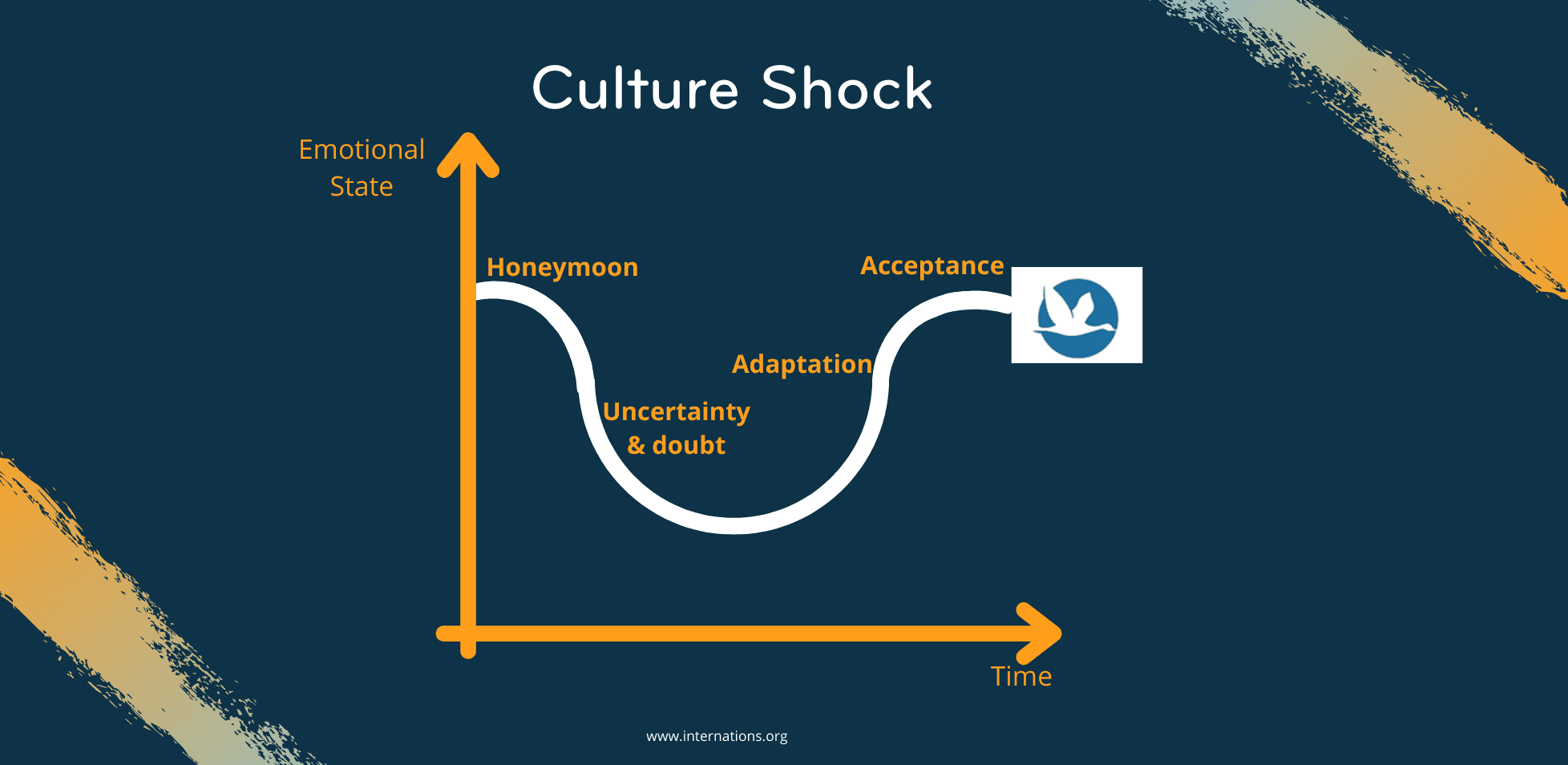The 4 Stages of Culture Shock
“There is wisdom in turning as often as possible from the familiar to the unfamiliar: it keeps the mind nimble, it kills prejudice, and it fosters humour.” This quote from philosopher George Santayana still holds true today. “Unfamiliar” often goes hand in hand with “scary”, however, new places can, and do, offer a positive experience, despite the initial culture shock that expats experience. There are ways to lessen the impacts of culture shock and understanding what the stages are is one of the most effective..
Culture shock is often split into four stages: honeymoon, uncertainty & doubt, adaptation, and acceptance.

The Honeymoon Phase
As the name suggests, the first few days and weeks in a new place can be compared to newlywed bliss. You are discovering your new surroundings, meeting your neighbors, trying new foods, and learning some basic phrases in a new language. It’s fun! It’s exciting! We experience this phase when we travel, a two-week holiday gives us that honeymoon feeling and just before the next stage creeps up on us, we get to go home. This obviously is not the case when we move to a new country. Sadly, the honeymoon period is a short-lived phase and soon the uncertainty and doubt will set in.
Uncertainty and Doubt
At this stage during your expat journey (normally around three months in), frustration sets in. This is arguably the hardest stage of the culture shock cycle. The language barrier, as well as cultural differences begin to get on your nerves. The realization that this is your new life can lead to feelings of sadness, uncertainty, doubt, anxiety, frustration, and even anger. During this stage, very simple things can trigger these emotions. You may find yourself saying things like “Why is everyone always late?” or “Why does everything require so much paperwork?”. You may not be able to remember your way home without looking it up or locals may not seem as friendly as before. At this point, you start to long for your old friends and family, you start to idealize your old life. Luckily, this stage comes to an end eventually, and you will start to adapt to our new home.
Adaptation
Routine, routine, routine — life gets easier at this stage! Having a routine is the most effective way to get out of the uncertainty and doubt of culture shock. With a structured week, you will get used to having lunch earlier than you normally do and organizing your rubbish into different bins. You will be more comfortable and familiar with the new language, people, and culture.
It is important to remember that this is a gradual and non-linear process, you might even go back to relive the uncertainty and doubt stage when you start to feel homesick. The seemingly snail pace of culture shock is frustrating, and you may not notice a change in your mental state until you look back and remember how much of an effort it was to go to the supermarket and remember the right things to say to the cashier. Now? You’re a natural at letting them know that you don’t need a receipt and that, yes, you would like a bag.

Acceptance
Finally, you reach the last stage, the one you have dreamed of! Acceptance of your new life is where you wanted to get to: you feel comfortable in your host country, you are no longer isolated, and have a strong sense of belonging. This doesn’t mean you understand every custom and quirk of a new country, but you have accepted you don’t need to in order to feel at home. It is important to note you may not feel the same euphoria as in the honeymoon phase, but the acceptance stage is long-lasting and more stable. Like every other expat, you get there eventually, you just have to be patient and enjoy the journey!
Culture shock is tough. Everyone goes through it when they move away from home, so don’t believe those Instagram posts of your friends floating seamlessly from country to country with an ease you can only dream of. They are struggling too! However, culture shock doesn’t have to be a bad thing. You will learn so much about yourself as you go through this cycle and it allows you to experience, and hopefully enjoy, your host country to the fullest. When you come out the other end, you can look back and be truly proud of yourself, of what you have achieved, and how you have integrated into your new home.
Advertisement
About Alannah Harris
Originally from Ireland, Alannah has enjoyed an expat upbringing and now studies economics and German at Cardiff University. She is working as the social media intern at InterNations.
Article topics
Related articles
Is Tough Love the Best Medicine for Homesickness?
Homesickness, it’s a feeling many, if not all of us have felt at some point in our lives. A longing for home is a state of mind that can impact your experience abroad in the most negative ways… that is, if you let it! Take the tough love approach and say bon voyage to feeling blue.
Unusual Christmas Traditions from around the World
Cultures from across the globe celebrate the holiday season in many different ways. Here’s a roundup of the most unusual Christmas traditions: from scary goat creatures to rollerblading parades to church, we cover everything from the weird to the downright nonsensical.
Plan, Prepare, Feast, and Enjoy! Tips for Celebrating National Holidays Abroad
Today Thanksgiving is being celebrated across the United States, but it’s not the only holiday famous for its delicious food. Feasts are an important part of many popular holidays and festivals around the world. As you’ll see, all these holidays have several things in common: family togetherness, cultural traditions, and epic amounts of food!
Books to Escape the Dullness of Social Distancing
While some people seem to be busier than ever during this pandemic, many others have more time on their hands. However, staying inside for a long time should not be a problem when you have good books to help you travel and discover new places far away without leaving your home.
The Top Ten Christmas Markets around the World
The Christmas season is finally upon us and what better way to get into the festive spirit than to visit a glittering Christmas market? Full of sparkling lights, traditional foods of Nöel, and plenty of activities for the kids, what’s not to like?




